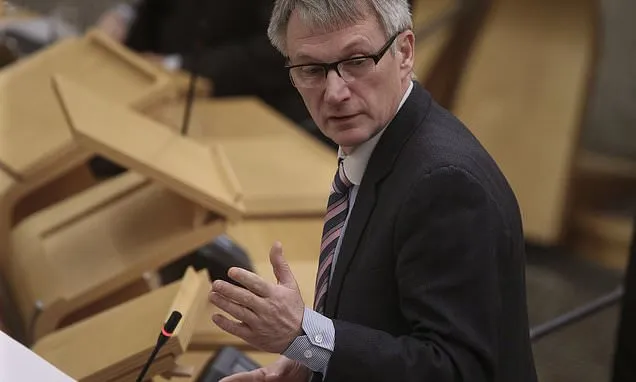£1 billion will be saved from the Scottish Government's budget and redirected to frontline public services, the public finance minister has announced.
Ivan McKee set out a range of reforms to Scotland's public sector on Thursday as he aims to make it efficient and fit for the future.
He said spending from "back office costs" will be cut by 20%, with the cash being redirected to frontline services.
By 2029-30, the Government estimates this will amount to £1 billion a year in savings, freeing up cash in areas such as the NHS.
"We must be bold and brave to deliver real, long-lasting and meaningful change," he told MSPs during his statement to Holyrood.
"This strategy demonstrates the Scottish Government is ready go further and faster than we ever have to reform our public services."
He said Scotland's public sector was "under strain" and that demographic shifts and rising demand were intensifying fiscal pressures.
He added: "Despite increased investment, public satisfaction with services has fallen. That must change."
Among the 80 actions set out in Mr McKee's reforms include changes to the culture of the public sector and those in charge of it.
The number of public bodies will be reduced to drive a more efficient system alongside a new review of public sector buildings.
The minister said the Government will embrace automation and new technology to digitise government.
Speaking to the PA news agency after his speech, the public finance minister dismissed the idea that his announcement amounted to cuts while denying his plans were an effort to tackle waste in the Government.
He also signalled the proposals were not about reducing the number of civil service jobs, which have increased since the pandemic.
"This isn't about cutting stuff," he said. "This is about redirecting resources to make sure they're maximised on the frontline."
Asked if his plans amounted to cuts, he said the Government was "moving resources" around from "back office costs" to the frontline, including through "corporate functions, through shared services, through removal of duplication" and improving how different parts of the public sector work together.
The minister said his plans were "not about losing jobs" but added that civil service jobs had decreased by around 3% last year, and pledged to continue that work.
He said the savings did not amount to "waste", and added: "I think the £1 billion point isn't the most important thing in the speech - the most important thing is the change in leadership and culture to so that public sector leaders are focused on collaboration and joining up services."
"It's about the budget processes that allow us to invest the money in prevention in one area the public service that then has huge savings in another part of the public service because we are preventing problems happening at source."
"At the moment, processes we have don't always allow that to happen, so it's addressing those so we get the right focus on the right things at right time."
Craig Hoy, Scottish Tory finance spokesman, questioned how the SNP would deliver the £1 billion in savings, having previously criticised his party's plans to make £500 million in tax cuts.
He told the minister: "This 49-page, 14,851-word wish list of word soup on the future of the public services does not mention the word waste once but it does say that the SNP Government has an ability to deliver real change within public services.
"Now I agree with that - they have delivered real change for the worse in Scotland's public services.
"Despite this Government telling us, the Scottish Conservatives, that it would be reckless to advocate for tax reductions of £500 million, today Ivan McKee says he can save £31 billion by simply cutting corporate functions by 20% over the next five years."
Daniel Johnson, Scottish Labour's finance spokesman, said he welcomed the "overall sentiment" but feared it amounted to "a plan for a plan".
He said Thursday's statement was "an acknowledgement that we have a billion pounds worth of waste".
He added: "Reform, to my mind, is not about shrinking the state, but maximising its effectiveness and you cannot ignore the fact that over the past decade, the civil service has grown at three times the rate of the NHS, while police, fire and colleges' headcounts have all fallen."
